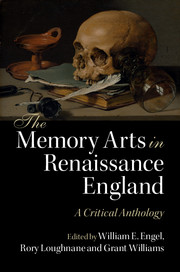Book contents
- Frontmatter
- Dedication
- Contents
- List of figures
- Acknowledgements
- A note on abbreviations
- Introduction
- PART I The art of memory
- PART II Rhetoric and poetics
- PART III Education and science
- PART IV History and philosophy
- PART V Religion and devotion
- Introduction to Part V
- V.1 Thomas More, A Treatise (Unfinished) upon these Words of Holy Scripture (1522)
- V.2 John Foxe, Acts and Monuments (1563)
- V.3 Thomas Playfere, The Pathway to Perfection (1593)
- V.4 Joseph Hall, selected works
- V.5 Richard Day, A Book of Christian Prayers (1608)
- V.6 Daniel Featley, ‘Four Rows of Precious Stones’ (1610)
- V.7 Lewis Bayly, The Practice of Piety (1613)
- V.8 John Donne, ‘Sermon, preached at Lincoln's Inn’ (1649)
- V.9 Stephen Jerome, A Minister's Mite (1650)
- V.10 E.M., Ashrea (1665)
- PART VI Literature
- Index
- References
V.3 - Thomas Playfere, The Pathway to Perfection (1593)
from PART V - Religion and devotion
Published online by Cambridge University Press: 05 August 2016
- Frontmatter
- Dedication
- Contents
- List of figures
- Acknowledgements
- A note on abbreviations
- Introduction
- PART I The art of memory
- PART II Rhetoric and poetics
- PART III Education and science
- PART IV History and philosophy
- PART V Religion and devotion
- Introduction to Part V
- V.1 Thomas More, A Treatise (Unfinished) upon these Words of Holy Scripture (1522)
- V.2 John Foxe, Acts and Monuments (1563)
- V.3 Thomas Playfere, The Pathway to Perfection (1593)
- V.4 Joseph Hall, selected works
- V.5 Richard Day, A Book of Christian Prayers (1608)
- V.6 Daniel Featley, ‘Four Rows of Precious Stones’ (1610)
- V.7 Lewis Bayly, The Practice of Piety (1613)
- V.8 John Donne, ‘Sermon, preached at Lincoln's Inn’ (1649)
- V.9 Stephen Jerome, A Minister's Mite (1650)
- V.10 E.M., Ashrea (1665)
- PART VI Literature
- Index
- References
Summary
About the author
Thomas Playfere (c. 1562–1609), doctor of divinity and clergyman of the Church of England, was one of the most celebrated preachers of the late Elizabethan period. After James I's succession in 1603, Playfere was made a chaplain-in-ordinary to the King and frequently preached before the court.
About the text
As the title page records, Playfere's sermon was preached at St Mary's Spital in east central London. Although contemporary accounts about the area are unclear, preachers appear to have delivered sermons in the open space before a pulpit cross in Spital square. The sermons in Easter Week were preached before the Lord Mayor and Aldermen and the masters and pupils of the nearby Christ's Church Hospital school. Playfere prefaces his sermon with a dedication (dated 1 February 1595) to Sir George Carey, a Knight Marshal and then Governor of the Isle of Wight. Carey had seemingly supported Playfere in his early education. The printed version of the sermon includes extensive quotations which were not read aloud when it was originally preached. The sermon is an exposition upon St Paul's Epistle to the Philippians 3:14: ‘But one thing, I forget that which is behind, and endeavour myself to that which is before, and follow hard, toward the mark, for the prize of the high calling of God in Christ Jesus.’ Playfere discusses the means by which the faithful must labour towards perfection. In our excerpt Playfere parses the meaning behind the second clause in the quotation, ‘I forget that which is behind’.
The arts of memory
Playfere, for all his rhetorical flourishes, rejects the formal Ciceronian art of memory. Adapting Themistocles's well-worn aphorism ‘[I'd] rather learn the art of forgetfulness’, Playfere proposes that the Christian subject should learn to forget their sinful past life (their ‘wicked works’). They should also forget their good deeds, for it is a vain activity to focus upon what one has already accomplished. But in rejecting memory in this way, Playfere reveals his own knowledge of the subject. He comments on Plato's philosophical writings on anamnesis (‘remembrance which the mind knew before it knew the body’) and employs the analogue of a wax tablet for retentive memory.
Textual notes
Thomas Playfere, The pathway to perfection A sermon preached at Saint Maryes Spittle in London on Wednesday in Easter weeke. 1593 (London, 1597), B8v–C2v; (second edition).
- Type
- Chapter
- Information
- The Memory Arts in Renaissance EnglandA Critical Anthology, pp. 238 - 241Publisher: Cambridge University PressPrint publication year: 2016



